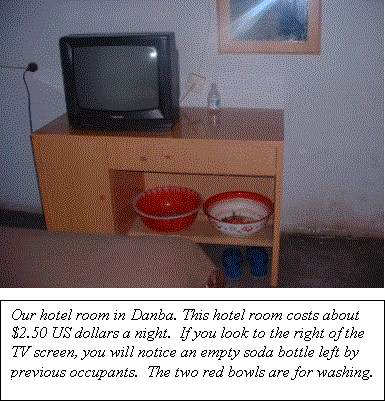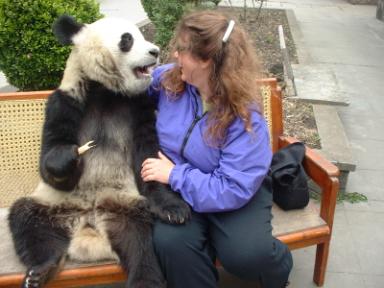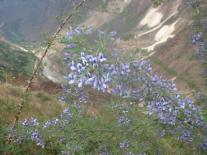China Cycling Travelogues
Do you have a China cycling travelogue you would like
to share here?
Contact us for details.

Danielle R. Reed
Cycling in Western Sichuan
Copyright © Danielle R. Reed, 2002.
Part 4
The sheets are clean but the floors are dirty.
Our trip was planned so that each night we would stay at a hotel: the hotels were similar in style, but differed in the degree of comfort. The key issue was the availability of hot water. If the hotel had hot, running water 24 hours a day in the room, we knew we had found the best hotel available. The next step down was hot water available during certain hours, or sometimes, we had to ask to have the hot water turned on so we could shower. There were rooms with running cold water but not hot water and there were rooms with no running water.

Here is a travel tip:
When you check into a Chinese hotel room, do not change your clothes when you arrive. If you do, you will be naked when the hotel staff brings you two enormous thermoses of hot drinking water. The thermos bottles of hot water are huge, and can provide enough hot water for many cups of tea. The bottles keep water so hot for so long that they seem magical. I would pour hot water from a thermos that had been in my room for 24 hours, and find the water burning hot.
By my standards, Chinese hotel rooms are somewhere between dirty and filthy, and there are usually things that previous guests left behind, like cigarette butts and old soda bottles. The floors usually have a smattering of mud, dirt and dried spit and I would never walk in the room unless I was wearing shoes or slippers. However, even in the dirtiest hotel rooms, the sheets had been changed—they are not clean, exactly, but you could tell they had been washed and dried. My coping strategy was not to look carefully at anything that I encountered in my hotel rooms. Mostly, I looked out the window and watched the activity and the scenery outside my room.
Some passing social commentary.
Biking in suburban Philadelphia, I feel sad that the farms and open land are being turned into homes with lawns. The change seems so rapid. Compared to the suburban sprawl we complain about, however, there is ten times more construction in China than the U.S.—this seems like an exaggeration, but it is the honest truth. No matter where I was, I saw something being either built or renovated. The aftermath of such an explosion in construction is hard to judge, and I plan a trip back in ten years time to see the outcome, but the immediate effect is that most people working look purposeful and satisfied, and there is a sense of optimism, that electricity, roads, clean water and prosperity will come to everyone. I felt pity for no one I saw, and my impression is that the average person thinks better times are ahead, and they are all working hard to make it happen. Maybe no one feels sad to see that houses and factories have replaced the farmland.
Disneyworld meets Pandaworld.
Some people in China, however, must be mindful about preserving land and rare animals, because they created a nature preserve for the Giant Pandas. Wolong is the name of the nature preserve, and part of it is an enclave where tourists can visit the Pandas. It has a hotel with clean rooms and hot water, a restaurant with white tablecloths and a menu, and landscaped lawns. When I looked out of my hotel room, across the lawn, I could see a construction site for the new hospital for the Giant Pandas, and beyond that is the place where about 40 Giant Pandas are kept in captivity. Coming to Wolong was like going to a zoo for pandas. Some pandas are babies, and they have a jungle gym to play on, and trees to climb, and frankly, are so cute that any attempt I might make to describe them sounds saccharin.
The meaning of the Giant Panda to the Chinese people is similar to the meaning of the Bald Eagle to Americans. They are both important symbols, but there is a slight twist for the Chinese. I didn’t realize it, but the Giant Pandas are also important money-makers and those workers that care for the Giant Pandas are under pressure to make sure the Giant Pandas are happy, healthy and reproduce as often as they can. Giant Pandas are rented to zoos around the world and a worker at Wolong told me that one zoo in the United States paid ten million US dollars for a ten-year panda rental. While I visited, impatient and expensively dressed Chinese men came, and were given tours of the areas off limit to the public, and these men had their pictures taken with the youngest pandas. My guess is that this is the political equivalent of dinner at the White House.
For a price, ordinary tourists can have their pictures taken with an adult Panda, and although I am ashamed to admit that I did it, I too had my picture taken. I may sound silly, but it was wonderful to be that close to a Panda, and it was a joyous moment for me—although my conscious was telling me that it was wrong to exploit an endangered species by turning it into a circus animal.

And in conclusion:
Although he meant it in a different context, Lance Armstrong had it right. It is not about the bike. Biking is one way to slow down, look around, be open to people you meet, get dirty, hungry, and thirsty and feel gratitude when you lay your head down at night. It is not the only way, but it is a good way.

To learn more about what I do at work, please see the web site at the Monell Chemical Senses Center (www.monell.org).
Danielle R. Reed - Cycling in Western Sichuan: Part 1 | Part 2 | Part 3 | Part 4
Bike China Adventures, Inc.
Home | Guided Bike Tours | Testimonials |
| Photos | Bicycle Travelogues
| Products | Info |
Contact Us
Copyright © Bike China Adventures, Inc., 1998-2012. All rights reserved.
